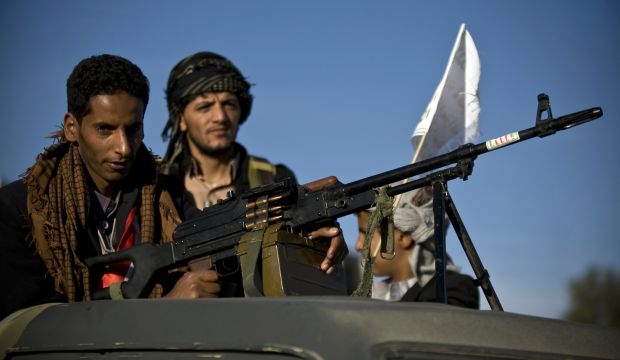
A Houthi rebel on patrol following dawn prayers attended by supporters of the rebels on the first day of the Muslim holiday of Eid Al-Adha, in Sana’a, Yemen, on October 4, 2014. (AP Photo/Hani Mohammed)
Sana’a, Asharq Al-Awsat—Ongoing violations by Houthi rebels currently in control of much of Sana’a have prompted a mass exodus from the capital, with many civilians traveling abroad or to other cities during Eid Al-Adha, sources told Asharq Al-Awsat.
The recent takeover of most state buildings and the reported looting of hundreds of homes by Houthi insurgents have prompted civilians to leave the capital for fear of further violations, with the Sana’a International Airport becoming packed with travelers, a local source speaking on the condition of anonymity told Asharq Al-Awsat.
The Shi’ite group has also stormed homes belonging to journalists, including that of the editor-in-chief of the Al-Qadiya newspaper and the former general manager of the Yemen TV channel, Abdul Ghani Al-Shmeiri, the source maintained.
The Houthis have taken almost full control of government facilities in the capital, including the airport, central bank and the headquarters of the Ministry of Defense. The group’s militias, known as People’s Committees, are carrying out patrols across the streets of the capital, in the absence of official police forces.
Meanwhile, the streets of Sana’a are full of signs that read: “Death to America, death to Israel, curse the Jews, and victory to Islam.”
The group took control of the capital amid sporadic violence in late September, following a month of protests by thousands of its members, who built and occupied protest camps across Sana’a to demand the resignation of the government and the restoration of fuel subsidies, recently cut as part of an economic reform package.
At the same time, Yemeni President Abd Rabbuh Mansur Hadi signed a UN-brokered deal with the group, promising to include Houthis in a new government and slash the cost of fuel.
The rebels’ occupation of Sana’a has raised concerns of a backlash by radical Sunni militants affiliated with Al-Qaeda in the Arabian Peninsula (AQAP), which has managed to maintain a presence in Yemen in the face of frequent US drone attacks and offensives by the Yemeni security forces.
The Al-Qaeda-linked Ansar Al-Shari’a group claimed responsibility for two attacks on Houthis in Sana’a and the city of Amran at the end of last week. On Friday, the group said on its Twitter account that several Houthis were killed and injured during a bomb attack on a Houthi base in Sana’a.
The group also claimed to have detonated a bomb on Thursday near a crowd of Houthis gathered in the city of Amran, north of Sana’a. “The explosion led to the death of 15 Houthis and injured others,” the group said in a statement, promising an “uncompromising war” against the Shi’ite insurgent group.
Earlier this week, a suicide bomber rammed a vehicle laden with explosives into a hospital in Ma’rib province where several Houthis were being treated. AQAP claimed responsibility for the attack, which killed one Houthi militant.
Meanwhile, a stalemate persists over naming the head of a national unity government being formed under the UN-brokered deal signed by President Hadi and the Houthis. While the Houthis insist on their right to put forward a candidate for prime minister, Yemen’s constitution stipulates that it is the president’s decision.
Several figures have been suggested recently as potential consensus figures, most prominently director of the Arab Labor Organization and former Yemeni minister Ahmed Luqman.
Despite signing the UN-backed agreement, the Houthis remain mistrustful of President Hadi, who replaced Ali Abdullah Saleh in 2012 following mass protests.
It is widely believed that sympathizers with Saleh within the country’s official military establishment have facilitated the entry of the Houthis into Sana’a.
In a recent interview, a senior Houthi figure, Ali Al-Imad, denied any “understandings” between his group and Saleh’s camp. But he admitted that the two “share common temporary interests.”
